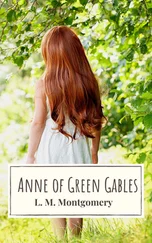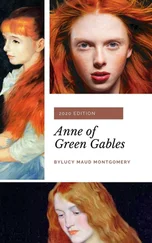“I’ll think on these things and go to bed. What a quilt to sleep under! I wonder if I’ll be as crazy as it by morning. And this is a spare room! I’ve never forgotten what a thrill it used to give me to sleep in any one’s spare room.”
Anne uncoiled and brushed her hair under the very nose of Annabella Tomgallon, who stared down at her with a face in which there were pride and vanity, and something of the insolence of great beauty. Anne felt a little creepy as she looked in the mirror. Who knew what faces might look out of it at her? All the tragic and haunted ladies who had ever looked into it, perhaps. She bravely opened the closet door, half expecting any number of skeletons to tumble out, and hung up her dress. She sat down calmly on a rigid chair, which looked as if it would be insulted if anybody sat on it, and took off her shoes. Then she put on the flannel nightgown, blew out the candles and got into the bed, pleasantly warm from Mary’s bricks. For a little while the rain streaming on the panes and the shriek of the wind around the old eaves prevented her from sleeping. Then she forgot all the Tomgallon tragedies in dreamless slumber until she found herself looking at dark fir boughs against a red sunrise.
“I’ve enjoyed having you so much, my dear,” said Miss Minerva when Anne left after breakfast. “We’ve had a real cheerful visit, haven’t we? Though I’ve lived so long alone I’ve almost forgotten how to talk. And I need not say what a delight it is to meet a really charming and unspoiled young girl in this frivolous age. I didn’t tell you yesterday but it was my birthday, and it was very pleasant to have a bit of youth in the house. There is nobody to remember my birthday now …” Miss Minerva gave a faint sigh … “and once there were so many.”
“Well, I suppose you heard a pretty grim chronicle,” said Aunt Chatty that night.
“Did all those things Miss Minerva told me really happen, Aunt Chatty?”
“Well, the queer thing is, they did,” said Aunt Chatty. “It’s a curious thing, Miss Shirley, but a lot of awful things did happen to the Tomgallons.”
“I don’t know that there were many more than happen in any large family in the course of six generations,” said Aunt Kate.
“Oh, I think there were. They really did seem under a curse. So many of them died sudden or violent deaths. Of course there is a streak of insanity in them … every one knows that. That was curse enough … but I’ve heard an old story … I can’t recall the details … of the carpenter who built the house cursing it. Something about the contract … old Paul Tomgallon held him to it and it ruined him, it cost so much more than he had figured.”
“Miss Minerva seems rather proud of the curse,” said Anne.
“Poor old thing, it’s all she has,” said Rebecca Dew.
Anne smiled to think of the stately Miss Minerva being referred to as a poor old thing. But she went to the tower room and wrote to Gilbert:
“I thought Tomgallon House was a sleepy old place where nothing ever happened. Well, perhaps things don’t happen now but evidently they did. Little Elizabeth is always talking of Tomorrow. But the old Tomgallon house is Yesterday. I’m glad I don’t live in Yesterday … that Tomorrow is still a friend.
“Of course I think Miss Minerva has all the Tomgallon liking for the spotlight and gets no end of satisfaction out of her tragedies. They are to her what husband and children are to other women. But, oh, Gilbert, no matter how old we get in years to come, don’t let’s ever see life as all tragedy and revel in it. I think I’d hate a house one hundred and twenty years old. I hope when we get our house of dreams it will either be new, ghostless and traditionless, or, if that can’t be, at least have been occupied by reasonably happy people. I shall never forget my night at Tomgallon House. And for once in my life I’ve met a person who could talk me down.”
Table of Contents
Little Elizabeth Grayson had been born expecting things to happen. That they seldom happened under the watchful eyes of Grandmother and the Woman never brighted her expectations in the least. Things were just bound to happen some time … if not today, then tomorrow.
When Miss Shirley came to live at Windy Poplars Elizabeth felt that Tomorrow must be very close at hand and her visit to Green Gables was like a foretaste of it. But now in the June of Miss Shirley’s third and last year in Summerside High, little Elizabeth’s heart had descended into the nice buttoned boots Grandmother always got for her to wear. Many children at the school where she went envied little Elizabeth those beautiful buttoned kid boots. But little Elizabeth cared nothing about buttoned boots when she could not tread the way to freedom in them. And now her adored Miss Shirley was going away from her forever. At the end of June she would be leaving Summerside and going back to that beautiful Green Gables. Little Elizabeth simply could not bear the thought of it. It was of no use for Miss Shirley to promise that she would have her down to Green Gables in the summer before she was married. Little Elizabeth knew somehow that Grandmother would not let her go again. Little Elizabeth knew Grandmother had never really approved of her intimacy with Miss Shirley.
“It will be the end of everything, Miss Shirley,” she sobbed.
“Let’s hope, darling, that it is only a new beginning,” said Anne cheerfully. But she felt downcast herself. No word had ever come from little Elizabeth’s father. Either her letter had never reached him or he did not care. And, if he did not care, what was to become of Elizabeth? It was bad enough now in her childhood, but what would it be later on?
“Those two old dames will boss her to death,” Rebecca Dew had said. Anne felt that there was more truth than elegance in her remark.
Elizabeth knew that she was “bossed.” And she especially resented being bossed by the Woman. She did not like it in Grandmother, of course, but one conceded reluctantly that perhaps a grandmother had a certain right to boss you. But what right had the Woman? Elizabeth always wanted to ask her that right out. She would do it some time … when Tomorrow came. And oh, how she would enjoy the look on the Woman’s face!
Grandmother would never let little Elizabeth go out walking by herself … for fear, she said, that she might be kidnaped by gypsies. A child had been once, forty years before. It was very seldom gypsies came to the Island now, and little Elizabeth felt that it was only an excuse. But why should Grandmother care whether she were kidnaped or not? Elizabeth knew that Grandmother and the Woman didn’t love her at all. Why, they never even spoke of her by her name if they could help it. It was always “the child.” How Elizabeth hated to be called “the child” just as they might have spoken of “the dog” or “the cat” if there had been one. But when Elizabeth had ventured a protest, Grandmother’s face had grown dark and angry and little Elizabeth had been punished for impertinence, while the Woman looked on, well content. Little Elizabeth often wondered just why the Woman hated her. Why should any one hate you when you were so small? Could you be worth hating? Little Elizabeth did not know that the mother whose life she had cost had been that bitter old woman’s darling and, if she had known, could not have understood what perverted shapes thwarted love can take.
Little Elizabeth hated the gloomy, splendid Evergreens, where everything seemed unacquainted with her although she had lived in it all her life. But after Miss Shirley had come to Windy Poplars everything had changed magically. Little Elizabeth lived in a world of romance after Miss Shirley’s coming. There was beauty wherever you looked. Fortunately Grandmother and the Woman couldn’t prevent you from looking, though Elizabeth had no doubt they would if they could. The short walks along the red magic of the harbor road, which she was all too rarely permitted to share with Miss Shirley, were the high lights in her shadowy life. She loved everything she saw … the faraway lighthouse painted in odd red and white rings … the far, dim blue shores … the little silvery blue waves … the range lights that gleamed through the violet dusks … all gave her so much delight that it hurt. And the harbor with its smoky islands and glowing sunsets! Elizabeth always went up to a window in the mansard roof to watch them through the treetops … and the ships that sailed at the rising of the moon. Ships that came back … ships that never came back. Elizabeth longed to go in one of them … on a voyage to the Island of Happiness. The ships that never came back stayed there, where it was always Tomorrow.
Читать дальше












